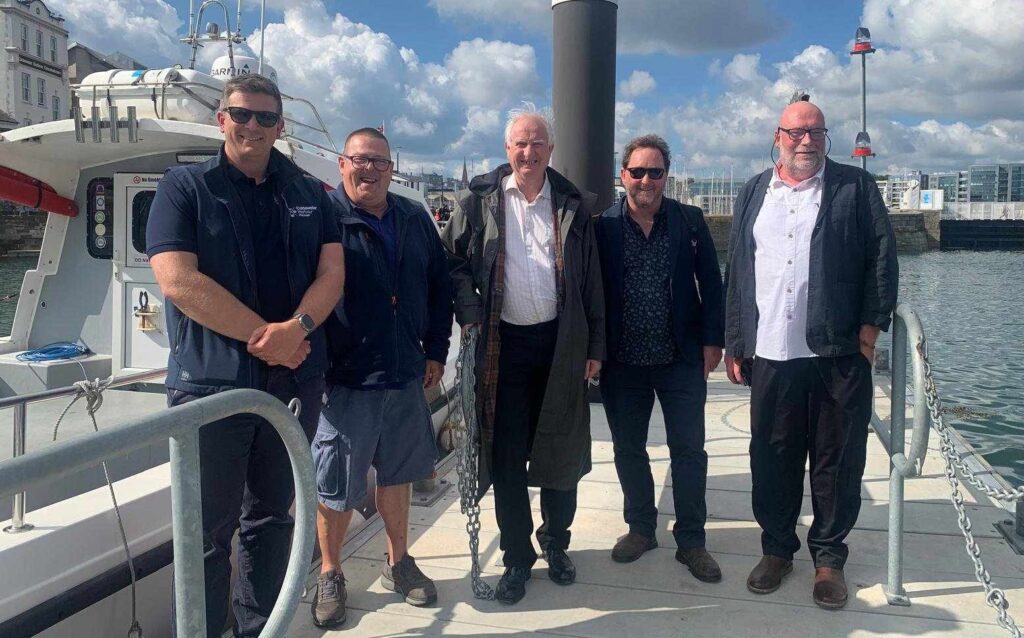DEFRA Minister for Food Security and Rural Affairs, Daniel Zeichner MP, met with the team behind the Pollack Fisheries Industry Science Partnership (FISP) during a visit to Plymouth this week.

Pollack FISP is a pioneering collaboration bringing together recreational charter skippers, commercial fishers, and scientists to better understand pollack stocks and the future of the fishery.
Hosted by key project partners including Senior Research Fellow at the Marine Biological Association and Associate Professor at the University of Plymouth, Dr Bryce Stewart, independent fisheries consultant Dr Simon Thomas, and Dave Uren from the Professional Boatman’s Association, the Minister was given an in-depth look at how collaborative, evidence-led approaches are driving practical solutions to real-world environmental challenges.
Following his meeting with the Minister, Dr Bryce Stewart expressed his thanks to Mr Zeichner and his team and said: “It was great to be able to share the results of our Pollack Fisheries Industry Partnership project with the Minister. The pollack fishery in the Southwest has declined significantly in recent years, and commercial fishermen have consequently faced tight management restrictions. However, there was surprisingly little known about the biology of pollack and previous stock surveys had mostly been done in other areas.
“By working with recreational charter skippers, anglers and commercial fishermen, we were able to fill many of these gaps and also gather perceptions of fishermen on both the state of stocks and ideas for how the fishery should be managed in the future.
“Daniel was particularly interested in these results, and also our general approach of bringing scientists and fishermen together to tackle environmental challenges, which can provide unparalleled levels of information and build trust between these different groups.” Dr Bryce Stewart.
The project has already spurred further collaboration with the commercial sector and explored the use of descending devices in catch-and-release angling, demonstrating how science and practice can align to improve fisheries outcomes.
Hannah Rudd, Marine Policy & Research Manager at the Angling Trust said: “It’s clear that if we want sustainable fisheries, we must work together – from scientists and anglers to commercial fishermen and policymakers. This project is a model of how we can deliver better data and better outcomes.”
Dr Bryce Stewart and the MBA were involved in the filming and scientific consultancy for Ocean with David Attenborough, which went on general release on 8 May and is due to be released on Disney+, Hulu and the National Geographic channel on World Ocean Day, 8 June.
One of the themes that emerges in the film is that of ‘balanced exploitation’.
Our work at the Marine Biological Association aims to find that balance: ensuring that people can continue to benefit from the sea, without compromising the ecosystems that sustain life beneath the waves. This year, World Ocean Day is celebrating the role that MSC-certified sustainable fisheries play in protecting the ocean. Projects such as our Pollack Fisheries Industry Partnership show how science, collaboration, and trust can deliver a more sustainable future for both ocean and industry.
This work also feeds into the objectives of the 2025 United Nations Ocean Conference, to Support the Implementation of Sustainable Development Goal 14: Conserve and sustainably use the oceans, seas and marine resources for sustainable development. The overarching theme of the Conference is Accelerating action and mobilizing all actors to conserve and sustainably use the ocean, something that the MBA continues to strive to achieve as the voice of marine biology.
While the Pollack FISP project has now ended, the team is seeking additional funding to ensure the data collection can continue. You can find out more about the project here.
Become a Member
Together, we are the voice of marine biology. Become a MBA Member Today – Save 25% with Code: Ocean25
- Offer valid from 7- 31 May 2025 (Monthly payments only).
- Join here.
MBA Membership gives you access to your own personalised MBA members online area, exclusive publications including the quarterly Marine Biologist magazine, the National Marine Biological Library collections and facilities, jobs and careers information, discounts on events, access to bursaries and more. Join here.